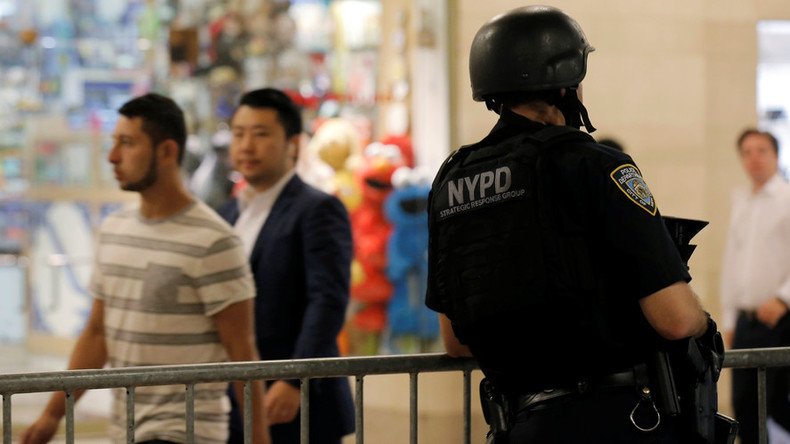NYPD to report use of force to public amid City Council drama

While the New York City Council and NYPD Commissioner Bill Bratton battle over police reform bills, three managed to be approved. One requires four detailed reports a year on use-of-force incidents, including the type of force and locations.
These three bills passed Thursday could change the transparency of the New York Police Department. In a week following anti-police brutality protests and tensions between civilians and law enforcement over the use of force, it is a small win for New York’s City Council.
The use of force reporting legislation passed 40-4. As a result, NYPD will be required to publicly report uses of force four times a year. The reports will include details about the force used, the precincts where it happened and any resulting injuries to civilians or police. In addition, cops will have to give a reason for stops that led to use of force.
NYPD officer dodges jail for stomping on man’s head, adds to ‘not uncommon’ cop crime statshttps://t.co/uD1VPt4Uefpic.twitter.com/SY01D3NotC
— RT America (@RT_America) June 24, 2016
Reporting districts is especially important to Councilwoman Debi Rose (D-Staten Island), who introduced that particular piece of legislation after learning that 70 percent of the city’s most sued police officers were from the 120th Precinct’s narcotics unit on Staten Island, the New York Daily News reported.
“I was shocked,” she told the Daily Mail. “These statistics were startling and very disturbing.”
While the bills could pose a positive step forward for police and civilian relations, there are a few gaps that have bothered some. For example, the bills do not require demographic information – such as race, to be entered into the reports.
One of the bill’s cosponsors, Councilman Rory Lancman (D-Queens) told the Daily Mail, “There was no conscious decision to exclude that kind of demographic data. And if that were part of the bill, yeah, it would be a better bill.”
3 NYPD commanders, including deputy chief, arrested on corruption charges https://t.co/mWoqgF9Qt2pic.twitter.com/d6UJcEwzrz
— RT America (@RT_America) June 20, 2016
“But it’s not a gaping hole,” he added, “The information has to be provided by precinct and that is a very reliable proxy for the demographics of the people involved.”
Being that this was in New York City where Police Commissioner Bill Bratton blamed New York Mayor Bill de Blasio for the shooting death of two officers in 2014, the vote did not go through without its share of drama.
Many City Council members noticed a glaring omission from the vote. One police reform bill, the Right to Know Act, would have required that police identify themselves to the public, inform a person being stopped that they have a right to refuse a search without probable cause and then receive proof that they consented.
The bill was backed by 53 rabbis across the city, the Daily News reported. In addition, it was supported by a women’s advocacy group called The Young Women’s Initiative.
NYPD cop points gun at video witness while arresting 'illegal' dirt biker (VIDEO) https://t.co/QiAd0rujDOpic.twitter.com/XM4caBQx7b
— RT America (@RT_America) May 23, 2016
Unfortunately, the bill was not supported by the founder of the The Young Women’s Initiative, Council Speaker Melissa Mark-Viverito, leading the bill to not be put to a vote Thursday, to the chagrin of the City Council. Mark-Viverito defended her choice, saying that the NYPD was making internal changes to require consent to searches and give out business cards in certain encounters.
Not everyone was as hopeful about the outcome of the bill’s goals. New York Civil Liberties Union advocacy director Johanna Miller told the Daily Mail, “The scary thing is it seems like the city that we’re living in, the commissioner has veto power over the City Council. And his ability to reject any laws that would impact the way police conduct themselves on the street is a really scary thing.”
“Transparency is a really important tool, but by itself it’s not going to change behavior,” she added.
Mark-Viverito has lashed out against claims that Bratton somehow influenced her decision to not put the Right to Know bill to a vote.
“No one intimidates me into the decisions I make. No one forces me to take a position,” said Mark-Viverito, addressing critics claiming that she made a deal with Bratton to kill the bills. “Anyone that wants to imply otherwise is just straight up wrong.”
Total entrapment’: NYPD targets minority shops for stings, warrantless searches – reporthttps://t.co/msZLqrdN8bpic.twitter.com/HMaVjiFn85
— RT America (@RT_America) April 23, 2016












